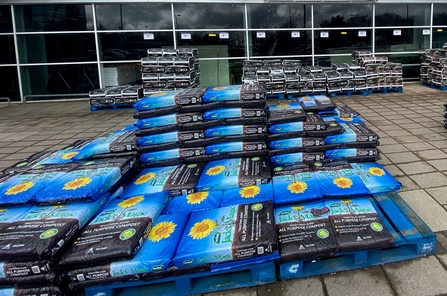
While some peat-containing products will be banned from shelves in 2027, others will be exempt from a ban until 2030.

While some peat-containing products will be banned from shelves in 2027, others will be exempt from a ban until 2030.
We call on the Government to introduce a total ban on the use of peat in the horticultural trade, as well its sale to the general public
Stephen Trotter, CEOCumbria Wildlife Trust
Defra (Department for Environment Food and Rural Affairs) has confirmed that while some peat-containing products will be banned from shelves in 2027, others will be exempt from a ban until 2030. This means that for some professional growers, peat use will still be permitted for the next seven years.
The Wildlife Trusts are calling upon the UK Government to:
Ailis Watt, peat policy officer at The Wildlife Trusts said: “Today’s announcement is bitterly disappointing. Last year we welcomed the news that the UK Government would ban the sale of bagged peat compost in England by the end of 2024. The Wildlife Trusts hoped that a ban on all peat products would follow shortly after this date.
“The destruction of irreplaceable peatlands for gardening should have been outlawed long ago. These precious habitats are vital for nature and for our climate because they store vast amounts of carbon and are home to some of the UK’s most special wildlife. We need to see far greater levels of ambition if the UK is to relinquish its status as one of the most nature-depleted countries on Earth or come close to achieving net zero emissions by 2050. Peatlands must be better protected as a matter of urgency.”
The announcement will allow a large proportion of professional growers to continue to use peat to grow plants and mushrooms. According to data from the Growing Media Monitor, plug plants and mushroom production alone made up 42% of all peat used by professional growers in 2021.
Stephen Trotter, CEO of Cumbria Wildlife Trust said: “We’ve been waiting for a very long 40 years for the Government to take effective action and bring to an end the damaging extraction of peat in England alongside peat imports from other countries.
“We call on the Government to introduce a total ban on the use of peat in the horticultural trade, as well its sale to the general public. Peat imports from elsewhere in Europe must also be banned to stop the ‘export’ of our damaging activities to other countries.”
Stephen added: “Many of Cumbria’s precious lowland peatlands have either been destroyed completely or are now in a severely damaged state. This has had a destructive and terrible impact on wildlife and the environment – and has added to the climate emergency.“
“Cumbria Wildlife Trust and our partners in the Cumbria Peat Partnership are working hard to restore damaged peatlands around Cumbria. In the last seven years, we’ve put around 6000ha of damaged bog into recovery. Indeed, several of the former peat extraction sites on the Solway and around Morecambe Bay are now managed as nature reserves but they will take thousands of years to recover and return to their former glory!
“Astonishingly and contrary to UK Government policy, there is still a large peat extraction site operating in North Cumbria. For professional growers like this, peat use will still be permitted for the next 7 years.”
“In the meantime, gardeners have plenty of successful alternatives to peat, so why not make the switch to peat-free compost immediately, if you haven’t done so already? You could also ask your garden centre or provider of pot-grown plants to confirm that their plants are not grown in peat – and if they are, go elsewhere!”
List of garden centres in Cumbria that currently stock peat-free compost.
Peatland importance
80% of the UK’s peatlands are now degraded as a direct result of damaging practices such as drainage for agriculture, burning and peat extraction for horticulture. Peatlands are important for biodiversity, home to a host of highly specialised and rare species – from the carnivorous plant, sundew, to Red-listed birds as well as reptiles, amphibians, insects and mammals. It is the lack of protections afforded to habitats like peatlands which has propelled the loss of almost 50% of the UK’s biodiversity.
Peatlands are also crucial carbon stores, locking away over three billion tonnes of carbon in the UK alone. However, when peatlands are damaged, this carbon is released. Today, emissions from peatlands make up 4% of all UK annual greenhouse gas emissions, and the UK is a world leader in emissions from degraded peatlands. To put this into context, every year emissions from degraded peatlands are equivalent to the carbon footprints of over 1.9 million British citizens.